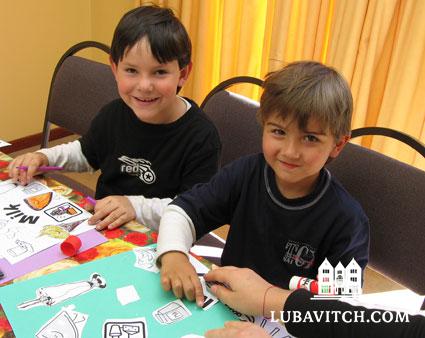Today six children engage in the hard work of learning through play and exploration at Chabad of Table View’s new Jewish Montessori preschool. Their next lesson: learning to share. At the beginning of next term, in January, seventeen new children will join the school.
Come January, Chabad of Cape Town’s executive director Rabbi Mendel Popack will complete Chabad’s 30th year in the seaside city by adding another young couple to the staff. While the world Jewish community wrote off Cape Town as an upcoming Diaspora ghost town, a victim of political change and mass emigration, Chabad of Cape Town focused on the future. Newest signs of growth: Rabbi Pini and Chani Hecht, who have been running JLI and educational programs from headquarters in Sea Point, and Rabbi Asher and Zeesy Deren, who are reaching out to the 500 Jewish families in Table View for the past two years.
Jewish public opinion is falling in step behind Chabad’s steady conviction that South Africa does have a Jewish future. According to a JTA report in October, 92% of Jews surveyed by the Kaplan Centre for Jewish Studies at the University of Cape Town reported that they were “fairly likely to stay” in South Africa. Back in 1998, that figure barely reached 71%.
Optimism about South Africa’s future and Chabad-Lubavitch have a long history together. Rabbi Popack and his wife Avigail landed in South Africa in 1976 just after the Soweto Riots, an uprising that had many South Africans packing their bags. Community leaders estimate that the Jewish population plummeted from its peak in the 60s at 125,000 to 80,000 due to fallout from Soweto and later waves of disquiet. Many doubted the new Chabad rabbi would last. “People said to us, in three years time you will be closing the lights in the airport,” Rabbi Popack recalled.
The Lubavitcher Rebbe did not agree. To the contrary, he offered repeated assurances that all would be well in South Africa and there was no need to flee. Michael Bagraim, National Chairman of the South African Board of Jewish Deputies, a self-described “very secular” Jew, credits the Rebbe’s encouragement as the glue that kept his family from leaving South Africa and dispersing all over the globe. “The Rebbe’s message was so true. It took us years to work it out, but it is so true,” said Bagraim.
When Chabad of Cape Town burnt down in the early 90s, Rabbi Popack worked to rebuild as others consolidated their synagogues. Not content to merely replace what was lost, Chabad Centre opened in 1992 in a better location with bigger rooms and more space. Supporting Chabad’s growth initiative is South Africa’s strong Jewish communal structure and philanthropic friends like Raymond Ackerman, Chairman of Pick’n’Pay, a large supermarket chain. Ackerman “had a vision for building South Africa, and he found an ally in the Lubavitcher Rebbe.” But the greatest miracle, as Rabbi Popack sees it, was the relatively calm transition from the old government to the new one. “There was a fear just like any other African country that it would be a revolution with bloodshed. It was not. One government handing over power to another so smoothly is a miracle.”
As the outlook brightens for Jewish South Africa, Chabad is using resources to focus on the up and coming generation. Its line up of programs is very young at heart. Jbiz, Chabad’s Jewish businessperson’s networking group, attracts 120 entrepreneurs to its monthly meetings. At ‘Who wants to be a minyanaire?,’ busy execs pray and study together each month. In a twist on the South African ‘Mr. Delivery’ food courier service, Chabad offers a rabbi who delivers both lunch and Torah learning.
In Chabad of Cape Town’s two-year-old Play Station Children, little feet patter on red, yellow and blue carpet squares. The children slide Jewish CD-ROMS and DVDs into players in the happily hued lounge that’s crammed with Jewish multimedia. The philosophy of Play Station, according to director Sosie Groner, is to show youngsters how exciting technology merges well with Judaism.
In Capetown, Jewish life is growing today. Recalling the years of doubt, when South African Jewry found itself in the fog of transition, Bagraim said: “It was very positive to see Chabad putting resources into a country that was, for all intents and purposes, destroyed.”

Be the first to write a comment.